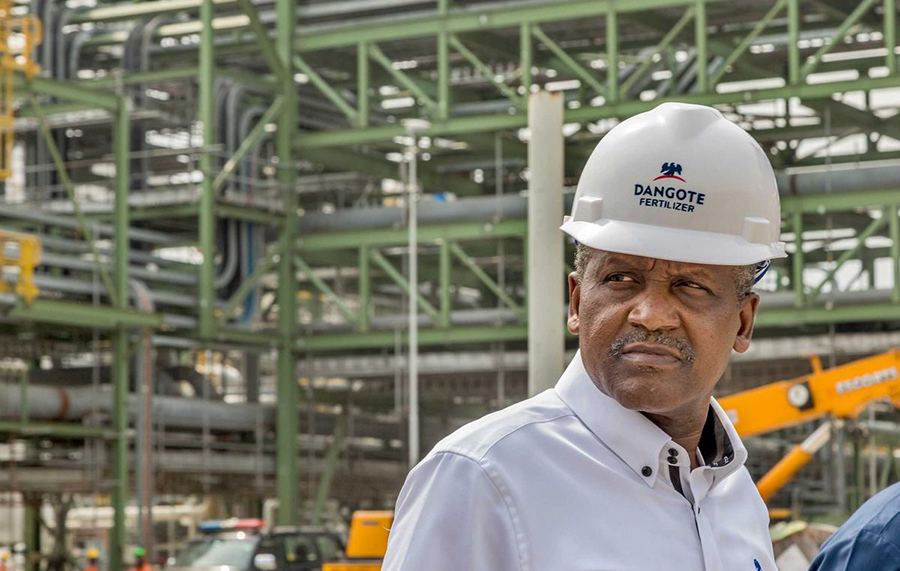Article summary
- Nigerian President Buhari will commission the Dangote refinery later this month, which is the first production facility since construction began in 2016.
- The refinery has a capacity to process 540,000 barrels of Nigerian oil per day, increasing to 650,000 barrels per day in the future, and hopes to develop the downstream sector of the economy and turn Nigeria into a net exporter of petrochemicals and refined petroleum products.
- The Dangote refinery is expected to satisfy Nigeria’s need for all refined goods and open up an $11 billion market for local petroleum products, reducing the need for expensive imports and fuel subsidies while creating jobs and reducing illegal oil refining in the Niger Delta Basin.
Nigerian President Muhammadu Buhari will commission the multi-billion-dollar Dangote refinery later this month, setting up the first production facility since construction began in 2016.
During the first phase of operation, it will be the world’s largest vertically integrated facility with a capacity to process 540,000 barrels of Nigerian oil per day, after which it will increase to 650,000 barrels per day. The cost of the Dangote refinery has increased from its original estimate of $12 billion to $14 billion to $19 billion after years of delays.
Dangote and the Nigerian government hope to develop the downstream sector of the economy and turn the nation into a net exporter of petrochemicals and refined petroleum products.
With a surplus available for export, the refinery is anticipated to completely satisfy Nigeria’s need for all refined goods, opening up an $11 billion market for local petroleum products.
- “Nigeria’s current account balance will improve slightly once the Dangote refinery is fully operational. You can save on typical shipping costs and other related costs. The country will no longer need to import refined petroleum, but it will also reduce its crude oil exports as some of the production will be used domestically,” said Moody’s Investors Service. NNPC owns a 20% interest in the Dangote Refinery and has priority to supply crude oil to the facility and the right to exercise 20% of the output from the facility.
In addition to refined petroleum products, the complex will also produce 4 million tons of jet fuel, 65 million liters of premium engine gasoline, 15 million liters of diesel, and 3 billion standard cubic feet of gas per day.
Backstory
Nigeria’s core problem is that despite being Africa’s largest producer of oil and gas, it relies almost entirely on expensive imports to meet its fuel needs. She has four state-owned refineries in Nigeria, but they are dilapidated and closed due to improper management.
Governments spend billions of dollars annually on fuel subsidies to mitigate social impacts. However, consumers feel the cost at the pump. This has also led to the smuggling of cheap gasoline from neighboring countries.
But economic problems are raging. In 2018, the IMF called on Nigeria to stem its mounting debt and diversify its economy to avoid a crisis. This is evident if you look at the oil sector. His pre-pandemic production of 1.8 million barrels per day plummeted to about 1 million barrels.
The country’s foreign exchange reserves are also in dangerous waters. It keeps shrinking year by year. International financial experts have warned that the country’s naira currency could be devalued if CBN FX reserves drop below $30 billion.
What you should know
The latest country survey by the World Bank leaves no doubt about how serious the situation is. “Nigeria is in a difficult economic situation that is deteriorating,” World Bank experts wrote in the study “Nigeria’s Choice,” released in December.
This will also reduce illegal oil refining in the Niger Delta Basin. This usually involves dumping crude from pipelines, often owned by foreign companies, and transporting it several kilometers away to makeshift refineries hidden in bushes and forests.
The stolen goods are cooked in large metal tanks by local refineries and distilled into products such as kerosene, diesel, and gasoline. After being refined, it is sold nationwide or exported overseas. However, sometimes the flames used to cook the crude oil can get out of control and cause an explosion.
The practice has seriously damaged the Nigerian economy, as crude oil and its substrates account for about 90% of Nigeria’s revenue stream, costing the country and its people billions of dollars. According to Nigeria’s Upstream Petroleum Regulatory Board, Nigeria will lose more than 115,000 barrels per day to oil bunkers between January 2021 and February 2022, for a total oil value of $3.27 billion lost.
Aliko Dangote’s factor
Aliko Dangote, president, and CEO of Dangote Industries Limited, has announced plans to increase the number of employees at his Dangote refinery project from 40,000 to 57,000 in the coming months.
According to him, the project currently employs 29,000 Nigerians and 11,000 foreigners of his own, with Ibeju in Lagos processing 650,000 barrels per day, making him the largest in the world in the Lekki region. increase.
- Dangote stressed the need for the country to diversify its economy by diverting attention away from oil exports. “As a country, we should not be satisfied with just making money from exporting oil because tomorrow people may not need it,” he said.












